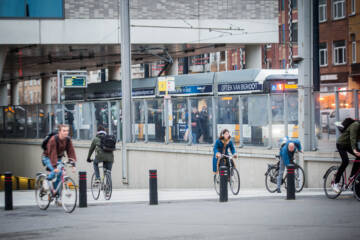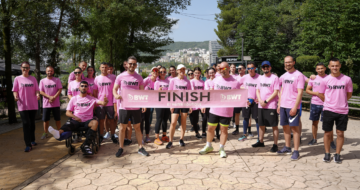The Smart Society and lessons from the pandemic

The Covid-19 pandemic has exposed some fundamental flaws in our social fabric. But if we can take learnings, a new system can emerge that is more resilient to the huge challenges our society is facing. Something different, better, smarter.
The Covid-19 pandemic has exposed some fundamental flaws in our social fabric. But if we can take learnings, a new system can emerge that is more resilient to the huge challenges our society is facing. Something different, better, smarter.
The Covid-19 pandemic has exposed some fundamental flaws in our social fabric. But if we can take learnings, a new system can emerge that is more resilient to the huge challenges our society is facing. Something different, better, smarter. What solutions and opportunities does such a Smart Society offer? Are we even prepared for it? And how do we embrace change? We are looking for the answers in a series of blogs in which we examine the past and the future of the municipal or urban settings. In this first one: observations.
The 21st century is one of unprecedented growth, when it comes to the (ageing) world population, global prosperity and urbanisation. However, these tendencies are increasingly conflicting. Moreover, the pandemic has been a rough awakening out of our illusionary social model that we can ‘take care of the community by taking care of ourselves'. That leaves us with choices: what do we sacrifice in exchange for more control over what is essential in our lives? In other words, what rules apply in a Smart Society, where city infrastructure, services and citizen behaviour interact?
From Smart City…
Pandemics have often been the drive for change. Modern sewers were introduced after the cholera epidemic in the 1850s and building ventilation standards date back to the Spanish flu in 1918. The current Covid-19 pandemic provides a similar watershed moment for the adoption of new technology and infrastructure for modern cities. Calling it the 'Smart City', a catch-all term to describe how technology and data analytics can make cities more sustainable and efficient. A profound impact on policymakers and residents in urban spaces is inevitable.
to Smart Society
But adapting urban infrastructure takes time and long-term vision. Covid-19 provides a window of opportunity for cities to look for creative, multidisciplinary approaches and to make Smart City principles the basis of all long-term urban planning. And yes, sometimes there are no obvious or ready-made solutions. The Smart City' with its focus on technology and data analysis is too limited to meet all societal challenges. That is why we broaden the view: the Smart Society is value-driven and based on (democratic) cooperation.
Privacy redefined and the government role
Covid-19 has put the balance between personal privacy, public health and security on edge. We now look differently at personal data and at the cooperation between private companies and the authorities, when sharing data on a controlled open source platform. In the future, this will be a key role for the government. In setting up and controlling such a platform, authorities must ensure that all citizens, regardless of socio-economic factors, can contribute to and benefit from data-driven knowledge and healthcare. When data is available, the application of smart city tools in the fight against Covid-19 has served as a blueprint for how technology can optimise all aspects of city life. For example, some cities have used anonymised mobile phone data to analyse and track travel patterns.
Urban mobility
Smart City methods have already proved their worth in the immediate response to the fight against a global pandemic. Some cities have widened pavements and built ‘pop-up’ bike lanes so that people can keep their distance. The human and economic impact of the virus has been enormous. But there has also been a new impetus to overcome bottlenecks and ingrained patterns. Just look at digital tools like video conferencing for managing and governing cities. Of course, these are just the first steps towards a ‘real’ Smart Society.
Subscribe to our newsletter!
Want to know more about how we can create a specific context for the changes and challenges outlined above? The second part of this article, "Smart Society", will map out this specific context before we can proceed to our (future) vision.
Latest insights & stories

VERKEERSVEILIGHEID
Sinds 2018 is het aantal verkeersslachtoffers in Vlaanderen opnieuw gestegen. Momenteel stagneren de cijfers, maar het risico op ongevallen met letsels blijft groot voor kwetsbare weggebruikers in Vlaanderen. En dat terwijl het verkeer veilig moet zijn voor alle gebruikers en modi. We willen hier verandering in brengen door te focussen op transparant beleid, trainingen rond veilig gedrag, infrastructurele verbeteringen, wetgeving en handhaving.

Wat is er nodig voor een meer circulaire bouwsector? Inzichten van Sien Cornillie, expert circulariteit bij NAV
NAV, of "Netwerk Architecten Vlaanderen," is een professionele organisatie voor architecten in Vlaanderen. Ze biedt diverse diensten aan, waaronder professionele ontwikkeling en belangenbehartiging voor architecten. Daarnaast bevordert NAV ook netwerkmogelijkheden en geeft het advies over juridische, technische en managementaspecten. Het netwerk werkt momenteel aan een standpuntennota rond circulariteit. We spraken met Sien Cornillie, expert circulariteit bij NAV, die in dit interview uit eigen naam spreekt.

A Global Movement: The World Unites in a Pink Pledge for Clean and Sustainable Water
5,000 participants. 32 countries. €30,000 funds raised. And that's just the beginning.
Picture this: One step that sends ripples across the globe, transforming lives and creating waves of change. You might wonder, how can such a simple action for most of us have such a profound impact?